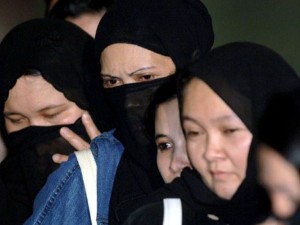Philippines seeks to solve Saudi maids row

Some of the 500 overstaying Filipino workers released in Saudi Arabia queue for the training scholarship certificates given by the government upon their arrival in Manila. AFP File Photo
MANILA, Philippines—The Department of Foreign Affairs said Friday it would hold talks with Saudi Arabia after the wealthy Middle East kingdom slammed its doors on Filipinos looking to work as domestic helpers there following a wage dispute.
Foreign Affairs Secretary Albert del Rosario said Saudi Arabia was one of the biggest host countries of foreign labor, with Manila estimating 1.3 million of nine million Filipinos working abroad were based there.
“This is a problem for us. We do have a significant number of our overseas Filipino workers in Saudi Arabia,” del Rosario told a press forum.
“This has to be dealt with by diplomatic means. I think the burden would rest on the Department of Labor.”
Presidential Spokesman Edwin Lacierda said Thursday a labor department representative would soon be dispatched to Riyadh to seek clarifications over the ban.
Saudi Arabia said on Wednesday it would stop granting work permits to Philippine and Indonesian maids after failing to agree on hiring conditions imposed by the Asian countries.
Del Rosario said the conditions were set in Philippine law as well as treaties to protect Filipino workers, but conceded that some host countries may struggle to comply.
Saudi Arabia had rejected Philippine demands for a base monthly pay of $400 for domestic workers, he said.
The Saudis also objected on privacy grounds to a Philippine requirement for the profiles of the Filipino workers’ ultimate employers as well as living conditions in their prospective places of work.
Del Rosario expressed hope that the perceived competitive advantage of Filipino workers would help break the impasse.
“Our people are very much in demand,” del Rosario said when asked if he believed the dispute would be resolved swiftly.
“We are hardworking, speak English, we are quick to learn and we’re very loyal. I think those are traits valued by employers all over the world, and I’m not speaking only of household service workers.”
